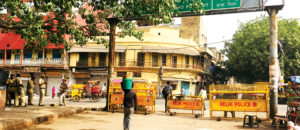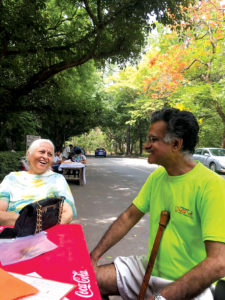In Old Delhi, business owners are angry about notebandi and GST; in New Delhi, voters insist these elections are about India—but some of them aren’t convinced
Jama Masjid
At 7 am on Sunday (May 12) morning, Ahmad Miyan was hurrying towards the polling booth near Jama Masjid, with his wife, Salma, in tow. It was a laboured walk through police barricades that wouldn’t allow vehicles beyond a point. Salma went in first, as they wouldn’t allow mobiles inside the polling booth, passing her mobile handset to Ahmad. He stood there clutching the two phones, catching his breath under the shade of a tree, his face tense and anxious.
After he has voted, the auto spare-part trader will head back home where his friends will be waiting to discuss the day. I ask him what was on his mind as he came out to vote: “What’s on my mind? Modi is coming back. Wahin janaab wapas aayenge (that gentleman will come back).” The question wasn’t about what psephologists of the day have been claiming. But Ahmad is preoccupied: “He is very popular, yes, yes. He is coming back.”
But what does he want from the government he would vote for? Silence ensues.
Ahmad’s eyes wander along the high walls of the government school, where the polling booth had just opened for voting. A lady police officer sits on a bench with the voter list. Other policemen around her are cordoning off the area, asking people on nearby pavements to clear up. Voters trickle in one by one. The morning has just begun.
Ahmad isn’t sure if the euphoria over the Modi government on social media corresponds to the sentiment on the ground, but he still won’t discuss the issues he is voting on today. As soon as Salma emerges from the booth, Ahmad, who at this point still hasn’t given me his last name, rushes in, advising me to read between the lines.

Salma broke into a dry smile. “Congress is the party that thinks about us, nahin?” she asks. Ahmad’s brother Ejaaz, who assists him in the business, has now joined her. He sounds bitter and angry. Fiddling constantly with his phone, he doesn’t look me in the eye. “Our business has gone to the dogs. We feel harassed by notebandi (demonetisation) and GST,’’ he says. In between his cryptic, one-line statements, he has been frantically making calls. “There are barricades everywhere. How will ladies come to the booth? They can’t walk this far. Do something, bhai, or it will be a huge loss,’’ he tells someone over the phone, walking away to speak in private.
More people emerge in far sight, on the street beyond the barricades—three burqa-clad women escorted by a young man on feet, two burqa-clad women on a rickshaw and another middle-aged couple walking briskly.
Javed Ansari’s mutton shop opens early morning on Sundays but today, he is here to vote for the Congress party. He turns around to show me the area where sitting MP and Congress candidate JP Agarwal’s ancestral house is. “He is a very good man, he lives among us,” he says. His face lights up with the name.
He says he just couldn’t think of anyone else, not even Aam Aadmi Party (AAP). “Oh, he (Arvind Kejriwal) may have done good work but that’s not a national name to bank on,’’ he insists. He still hasn’t talked about the Bharatiya Janata Party (BJP), preferring to talk more about the manner in which politicians have asked for votes these elections. “It’s all been very different from previous years. They, oh, the way they ask for votes,’’ he rues. “It’s as if they will exile us if we wouldn’t vote for them. Is this the way to ask?”
Just a couple of hundred metres away, Sarvodaya Kanya Vidyalaya no. 1 is a polling booth too. It is flanked by an ancient temple at its door, and dishevelled street dwellers along its boundary, even as Jama Masjid appears on the horizon. A mother tends to her sick child on a rack of folded tin chairs right outside, watching the voters move in one by one.
Ankur Gupta, a hardware shop owner from Chawri Bazaar, appears at the door of the booth and slips inside the temple on his left. He is travelling out of Delhi today but has come out to vote first not because he wanted to but because he hardly has in the past.

“Politics doesn’t interest me and I don’t care which party wins but I do care about the fact that my business is no more the same size as it used to be five years ago. During notebandi, I suffered huge losses. Even the GST is a hassle,’’ he says, sounding agitated. “I have to fill the plate for my family. Unless my tummy is full, I can’t appreciate anything anyone does for me. Can you?”
Ranjit Sharma, a small engine oil business owner, standing next to Gupta takes the cue and nods in agreement.
Greater Kailash
It’s easy to spot the polling booth in Greater Kailash—men around three desks on one side of the road sit with area voter lists, colourful party flags and bandana wrapped around their foreheads. They are all very quiet at this point, hustling only when someone needs help with voter ids. These volunteers represent the three main political parties in the electoral fray: the BJP, the Congress and the AAP, acting like “customer service agents” on what they expect to be a very busy polling day.
Manju Lal says she has a rental income and a small business but GST has made her operations easier. “Filing multiple taxes like VAT earlier was very time-consuming and complex. This is such a relief,’’ she says, settling down on a chair. “Anyone who complains about GST isn’t running a fair business. Only people who were shady about their trade have faced problems,” she insists.
This gathering of volunteers is getting bigger—voters going in to vote keep joining the table prompting Manju Lal to get more chairs from her home. She has also ordered ice creams, fruit juices and water for everyone. It’s now a large circle and everyone joining the conversation keeps asking friends to join in. Professors, magazine publishers, DDA engineers, Delhi government officers, IAS, Yoga and Pilate trainers, doctors, social activists, home bakers and boutique owners have all converged. They all agree with Lal’s assertion that the elections this year are being fought for India, and not for any party. “An India that is strong and tough on terror, corruption-free, and big on reforms. We are voting for trust and stability,’’ says Kishore Babu, who edits World Focus magazine.
Yet, it’s clear by the passing minute that India and Modi (to this set of voters) are one. A slight mention of Sadhvi Pragya, Yogi Adityanath, cow vigilantism and attack on institutions throws this gathering into a frenzy. They all want to respond to this criticism of Narendra Modi’s regime. “Why should we be ashamed of being Hindus? Can you make Muslims eat pork? What’s wrong in asking for a ban on cow slaughter? Why, our religious sentiments are easy to ride over because we are tolerant?” says a vehement Manju Lal, vigorously waving her hands.
The AAP volunteer, who didn’t want to be named, said the charge of Muslims feeling unsafe in a Hindu majoritarian India was unreal. “This is casually thrown around but the truth remains, Hindus are unsafe where Muslims are even 30 per cent of the population,” he asserts, apologising in the same breath. “Sorry for sounding communal.”
Prof. Kapil Kumar from Indira Gandhi National Open University has written a set of poems on the elections mocking the Congress chief Rahul Gandhi. He claims he has done field surveys with labourers in Uttar Pradesh and taxi drivers in Delhi. “They are voting en masse for the BJP,” he confidently declares and leaves for a tour of the city. Polling day excitement has gripped everyone. Kishore Babu by this time has returned to the gathering with copies of the magazine he edits. There is the latest article on China and India finally collaborating on Islamic terrorism. “You see, only a strong government led by Modi can do this. He has worked on (India’s) relationship with the world while curbing corruption internally. Today, bureaucrats can’t spend hours idling at Lutyens Delhi’s elite clubs making deals. They are at work and they are being made accountable,” Babu says with a grin.
Someone talks about the cleanliness drive in Varanasi, Modi’s constituency. “I wouldn’t set my foot there earlier. The ghats were that filthy! But now, I can go there again and again. Such joy!” Manju Lal says. Phrases like “award-wapsi gang”, “Congress apologists”, “enemy of development” are used liberally to describe those who are critical of the Modi government. Suddenly, someone jokes that he has voted NOTA. The crowd makes a noise, saying that disqualifies him from sitting at the table. “That’s the problem with this party. If you are not with them, you are against them,’’ he says, walking away.
Crowds approach the booth slowly. There are young couples with small children, old men and women, and young boys voting for the first time. They say they are worried about jobs, inflation, attacks on institutions, crime against women, and beef ban. Dipali Dwivedi, a resident who had great difficulty last year in selling off the land due to demonetisation, says she had a tough time sending her son abroad for studies as she and her husband had invested in the land for the purpose. “Now the land prices have dwindled. My plot is going at half the rate it was at earlier,’’ she says. Dipali has just shopped for grocery and fruits and it has cost more than Rs 2,000. “This won’t last me beyond two days. The Modi government may be working for good in the long run, but these are my everyday problems,” she says.
www.newslaundry.com





